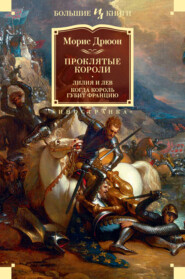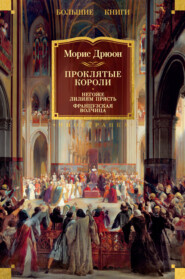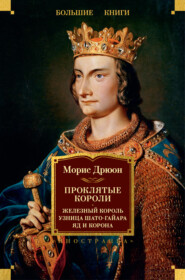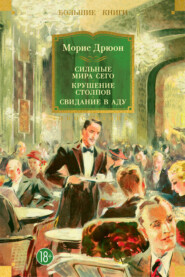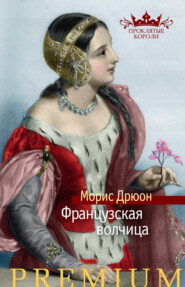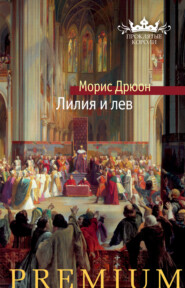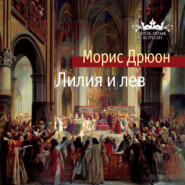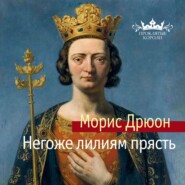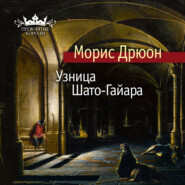По всем вопросам обращайтесь на: info@litportal.ru
(©) 2003-2025.
✖
The She-Wolf
Автор
Год написания книги
2019
Настройки чтения
Размер шрифта
Высота строк
Поля
But equity goes for nothing in settlements between kingdoms. The treaty Monseigneur Saint Louis concluded with Henry III Plantagenet, in the Year of Grace 1259, was so confused that a cat couldn’t have found her kittens in it. Even the Seneschal de Joinville, your wife’s great-uncle, Cousin Mortimer, who was devoted to the sainted King, advised him not to sign it. Indeed, we have to admit frankly that the treaty was a piece of folly.’
Robert felt like adding: ‘As was also everything else Saint Louis did, for he was undoubtedly the most disastrous king we ever had. What with his ruinous crusades, his botched treaties, and his moral laws in which what is black in one passage is discovered to be white in another … Oh, how much happier France would have been had she been spared that reign! And yet, since Saint Louis’s death, everyone regrets him, for their recollection is at fault; they remember only how he dealt out justice under an oak and, through listening to the lies of bumpkins, wasted the time he should have been devoting to the kingdom.’
He went on: ‘Since the death of Saint Louis, there has been nothing but disputes, arguments, treaties concluded and broken, homage paid with reservations, hearings by Parliament, plaintiffs non-suited or condemned, rebellions in those lands and then further prosecutions. But when you, Charles, were sent by your brother Philip the Fair into Aquitaine,’ Robert asked, turning to Valois, ‘and so effectively restored order there, what were the actual motives given for your expedition?’
‘Serious rioting in Bayonne, where French and English sailors had come to blows and shed blood.’
‘Very well!’ cried Robert. ‘We must organize an occasion for more rioting like that of Bayonne. We must take steps to see that somewhere or other the subjects of the two Kings come to serious blows and that a few people get killed. And I believe I know the very place for it.’
He pointed his huge forefinger at them and went on: ‘In the Treaty of Paris, confirmed by the peace of 1303, and reviewed by the jurists of Périgueux in the year 1311, the case of certain lordships, which are called privileged, has always been reserved, for though they lie within the borders of Aquitaine, they owe direct allegiance to the King of France. And these lordships themselves have dependencies, vassal territories, in Aquitaine, but it has never been definitely decided whether these dependencies are subject to the King of France or to the Duke of Aquitaine. You see the point?’
‘I do,’ said Monseigneur of Valois.
His son, Philippe, did not see it. He opened wide blue eyes and his failure to understand was so obvious that his father explained: ‘It’s quite simple, my boy. Suppose I gave you, as if it were a fief, the whole of this house, but reserved to myself the use and free disposal of this room in which we are now sitting. And this room has, as a dependency, the ante-room which controls this door. Which of us enjoys rights over the ante-room and is responsible for its furnishing and cleaning? The whole plan,’ Valois added, turning back to Robert, ‘depends on being able to arrange action of sufficient importance to compel Edward to make a rejoinder.’
‘There’s a very suitable dependency,’ the giant replied, ‘in the lands of Saint-Sardos, which appertain to the Priory of Sarlat in the diocese of Périgueux. Their status was argued when Philip the Fair agreed to a Treaty of Association with the Prior of Sarlat, which made the King of France co-lord of that lordship. Edward I appealed to the Parliament of Paris, but nothing was decided.
If the King of France, as co-lord of Sarlat, builds a castle in the dependency of Saint-Sardos and puts into it a strong garrison threatening the surrounding territory, what does the King of England, as Duke of Aquitaine, do about it? He must clearly give orders to his Seneschal to oppose it, and will want to station troops there himself. And the first time a couple of soldiers meet, or an officer of the King is maltreated or even insulted …’
Robert spread wide his great hands as if the result was obvious. And Monseigneur of Valois, in his blue, gold-embroidered, velvet robes, rose from his throne. He could already see himself in the saddle, at the head of his banners; he would leave for Guyenne where, thirty years ago, he had won a great victory for the King of France.
‘I congratulate you, Brother,’ cried Philippe of Valois, ‘on the fact that so distinguished a knight as you are should also have as great a knowledge of procedure as a lawyer.’
‘Oh, there’s no great merit attached to that, you know, Brother. It’s not from any particular liking that I’ve been led to inquire into the laws of France and the edicts of Parliament; it’s due to my lawsuit about Artois. And since, so far, it has been no use to me, let it at least be some use to my friends,’ said Robert of Artois, bowing slightly to Roger Mortimer, as if this whole great affair was being organized entirely for his benefit.
‘Your coming has been of great assistance to us, my lord,’ said Charles of Valois, ‘for our causes are linked, and we shall not fail to ask you most strictly for your counsel throughout this enterprise, which may God protect!’
Mortimer felt disconcerted and embarrassed. He had done nothing and suggested nothing; but his mere presence seemed to have occasioned the others to give concrete form to their secret aspirations. And now he would be required to take part in a war against his own country; and he had no choice in the matter.
And so, if God so willed it, the French were going to make war in France against the French subjects of the King of England, with the support of a great English baron, and money furnished by the Pope for the freeing of Armenia from the Turks.
5 (#ulink_6365549e-b27d-57ad-945e-1a5e43eb4744)
A Time of Waiting (#ulink_6365549e-b27d-57ad-945e-1a5e43eb4744)
THE END OF THE autumn passed, then winter, spring and the beginning of summer. Roger Mortimer saw Paris in all the four seasons of the year. He saw mud accumulating in its narrow streets, snow covering the great roofs of the abbeys and the fields of Saint-Germain, then the buds opening on the trees by the banks of the Seine, and the sun shining on the square tower of the Louvre, on the round Tower of Nesle and on the pointed steeple of the Sainte-Chapelle.
Вы ознакомились с фрагментом книги.
Приобретайте полный текст книги у нашего партнера:
Приобретайте полный текст книги у нашего партнера:






